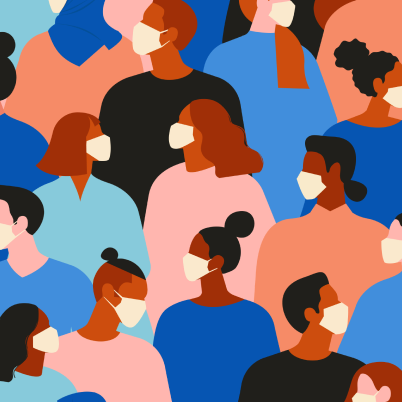
There is no better way to discuss telemedicine for key population than telling the relatable stories of every day people like you and I.
Paul Linus (not his real name), an HIV+ gay man living in Lagos, Nigeria, was relieved of his job shortly after the lockdown was eased. It’s been four weeks since he became jobless and Paul is gradually slipping into depression.
Of course, he wouldn’t be the first or only person to lose his job. Millions of lives have been affected economically. Matter of fact, the job-loss wind is global, with millions of workers losing their jobs. The new normal, you may say.
But Paul’s case is a little different. As a result of his health condition, Paul goes to the hospital at regular intervals to consult his doctor. Paul is reluctant to visit the hospital for obvious reasons and since he already has an underlying medical condition (HIV), he feels it is safer to stay away from the war zone.

The big question is, how then can Paul access quality healthcare without seemingly putting himself in harm’s way?
While we ponder over this, Kemi Daniels (not her real name), a drug addict in Abuja, is finding it difficult to access healthcare services for fear of discrimination and criminalization. As someone who injects drugs, Kemi often relies on drug peddlers from other states. As the borders remain closed because of the pandemic, there are drug shortages on the streets. Kemi now resorts to alcoholism and sharing intravenous injections with her friends, consequently making them prone to infections.

Kemi will definitely appreciate remote counselling from a healthcare professional but going to the hospital is not the best option for her.
How best can Kemi receive professional help while maintaining her privacy and confidentiality?
These questions are significant because people like Paul and Kemi, being gay and drug addict respectively, form major parts of the key population who are hitherto still marginalized in mainstream Africa. They are also a part of the vulnerable groups in Nigeria.

“Key populations” typically refer to groups of people who are at increased risk of certain health issues or face specific social, economic, or legal challenges that may impact their access to healthcare services. These groups often include marginalized or vulnerable populations such as men who have sex with men (MSM), sex workers, people who inject drugs, transgender individuals, and those who identify as LGBTI (lesbian, gay, bisexual, transgender, and intersex).
Key populations may also include other groups such as migrants, prisoners, adolescents, and indigenous populations, depending on the context of the discussion, research, or healthcare program.
In the context of public health and healthcare planning, addressing the needs of key populations is crucial for promoting health equity and ensuring that healthcare services are accessible and tailored to the diverse needs of all individuals.
As populous as Nigeria is, accessing quality healthcare remains a significant challenge for key populations. Discrimination, stigma, and limited access to healthcare facilities compound their struggles, increasing the health gaps. However, amidst these challenges, telemedicine emerges as a beacon of hope, offering a lifeline to marginalized communities.
According to UNAIDS’ estimate, 62% of the new HIV infections are among the key populations. Since they have the highest burden of underlying health issues like HIV, they have an increased risk for severe illnesses from communicable diseases.
Traditional healthcare settings may not be welcoming or accommodating to their needs, leading to avoidance of seeking medical care altogether. Additionally, accessing specialized services, such as HIV testing and treatment, can be particularly challenging for these communities.
While these set of people experience an increased tendency to contract diseases like HIV, they have decreased access to quality healthcare services. This calls for concern as the reports of a survey carried out by UNAIDS (2020) reveal that the Coronavirus pandemic triples the vulnerability of persons who identify as ‘lesbian, gay, bisexual, transgender and intersex’ (LGBTI).
While the government provides support to vulnerable groups like displaced persons, pregnant women, and children, key populations are often overlooked.
Through virtual platforms, individuals from key populations can access confidential and non-judgmental healthcare services from the comfort and privacy of their homes. Telemedicine bridges the gap between marginalized communities and healthcare providers, offering a safe space for seeking medical advice, treatment, and support.

One of the key advantages of telemedicine is its ability to ensure confidentiality and privacy for individuals seeking care. For marginalized populations who may fear discrimination or persecution, virtual consultations provide a level of anonymity that traditional healthcare settings often cannot guarantee. This confidentiality encourages individuals to seek timely medical attention without fear of reprisal.
Telemedicine allows healthcare providers to offer tailored services that meet the unique needs of key populations. Culturally competent care, sensitivity to gender identity, and understanding of sexual orientation are integral aspects of telemedicine consultations. By acknowledging and respecting individual identities and experiences, telemedicine fosters trust and encourages engagement with healthcare services.
Telemedicine overcomes structural barriers that hinder access to healthcare for key populations. Geographical distance, transportation challenges, and limited availability of healthcare facilities no longer serve as insurmountable obstacles. Through telemedicine, individuals from remote or underserved areas can connect with healthcare professionals without leaving their communities.
As telemedicine expands in Nigeria, advocacy for inclusivity and accessibility must remain at the forefront. Ensuring that telemedicine platforms are designed with the needs of key populations in mind is essential. This includes providing language options, accommodating disabilities, and offering culturally sensitive resources.
Telemedicine empowers key populations to take control of their health and well-being. By providing access to comprehensive healthcare services, telemedicine promotes early intervention, disease prevention, and continuity of care. Moreover, it fosters a sense of agency and autonomy among marginalized communities, enabling them to make informed decisions about their health.
KompleteCare, as a telemedicine platform, makes it possible for certified doctors to provide care to patients remotely via their smartphone or computer. What this implies is that patients can comfortably receive medical care from the comfort of their homes without necessarily paying an in-person visit to the hospital or to a doctor.
By extension, the KompleteCare platform is able to cater to the health needs of sex workers, men who sleep with men, others who identify as ‘lesbian, gay, bisexual, transgender and intersex’ persons (LGBTI), and drug users who are mostly discriminated against. With the belief that every human being deserves equal access to healthcare, the platform is built for this sole purpose with features that guarantee privacy and confidentiality.
KompleteCare is the way to experience safe, quality, and non-discriminatory healthcare service.
Consult a Doctor Online today!
healthcareAugust 20, 2025
healthcareSeptember 10, 2025









Henry
This is nice
Jenny
Is Nigeria really ready for LGBTI?
Ginika Oluchi Okeke
Good question.
The truth is that we do not know if Nigeria is ready for it, but our point is that they too have a Right to access healthcare.
Jude Isaac Ugwummadu
Together we are stronger go on girl💪🏿
Oluwafemi Salami
I think I agree with the writer when she said “…everyone deserves equal access to medical health care” and this should come without any discrimination, although telemedicine may have its limitations it’s still a way to go as its total absence in a Pandemic such as the Covid 19 poses serious threat to the general wellbeing of the society ie the unwell and well will not be safe
Ginika Oluchi Okeke
I strongly agree with you.
Barr Anoh.
I want to believe that the author of this article is inspired by God because the message is convincing. I suggest this article should be published world wide.
Flourish
such a precise article. Thank you.
Harmony
Thanks for this
In as much i never supported this LGBTI idea, but by right i believe no matter who is who, we all deserve equal right both medically and otherwise Nice one dear 👍🏻
Faith
Nice piece
Chisom Osuigwe
Despite our pronounced differences, it’ll be good for all to have access to good healthcare.
King David
Nice perspective.
Clergy
No matter the condition, every human deserves quality healthcare
RUTH IYEN
Nice one
Nneamaka Okeke
Wow…this is well articulated. Kudos!
Nkem
Yes… everyone should have access to good and ‘affordable’ healthcare despite their way of life. Nice!
Anna
I believe everyone deserve equal access to healthcare no matter the person statue,background etc kudos to u, nice article
Gboyega A
Thanks Ginika!
This is a very interesting article
Floorence Agha
Nice article.
More Grace to you.
Freeman Korkara Kobo
While frowning at those Sodom and Gomorrah who are enormously stupefied by the ominous freaky-deaky jocundity of the youthful exuberance christened, LGBTI, and conversely praying for their roads to Damascus as well as repentance to come in a moment too soon, it is also epedient to envisage issues threatening their existence. If this job is part of what KompleteCare does, as very lucidly described by this article, then both the writer and the blog deserve some applause.
Ginika Oluchi Okeke
Well, let us leave God to judge. Our duty on earth is to love one another. Great comment Mr. Freeman.
Johnson
You are such a wonderful human being inside-out. Be proud of what you do, yes every human deserves a good quality healthcare. Nice insight.
Labake
💪🏽 💪🏽💪🏽
Joftfem
Insightful
Somtoo Dominic
Nice
Akoja Faith
The fact that our Societal norms frown at any lifestyle that deviates completely from that of the model set by our traditional African society, doesn’t make the queer and others… less human. Medical care should be given and accessible to everyone despite their shortcomings. Keep it up Ginika.
Chiamaka ogodinma
I enjoyed reading this article as its informing,ducating and entertaining . I personally didn’t want to visit the clinic when I fell sick during this covid pandemic to avoid getting infected. However I concur with the writer as everyone has equal access to medical health care and therefore there should be no discrimination whatsoever.
Bishop
A masterpiece…very helpful!
Eke kalu
Quite interesting!
Kompletecare is bringing succor to the marginalized in the society.